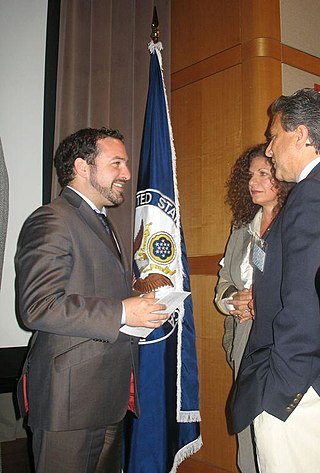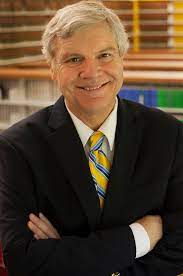ESBRI - Entrepreneurship and Small Business Research Institute - is a Swedish autonomous institution which disseminates research-based knowledge on entrepreneurship, innovation and small business. ESBRI was founded in 1996 through a donation by Leif Lundblad, a Swedish inventor and entrepreneur. The overall aim of ESBRI is to stimulate entrepreneurship in Sweden.
ESBRI is independent of economic, political and religious interests. Through the years ESBRI has been financed by both private and public funds.
ESBRI arranges the open lecture series Estrad in Stockholm (ten times per year), publishes the magazine Entré (four times per year), and the newsletter e-Entré (ten times per year). ESBRI also organizes a series of other seminars, workshops and conferences. One of the major annual conferences is The Sweden-U.S. Entrepreneurial Forum Archived 2013-12-12 at the Wayback Machine , which is organized jointly with the Swedish Ministry of Enterprise and Innovation and U.S. Department of Commerce. ESBRI - in collaboration with the Swedish governmental agency Vinnova - also organizes a PhD course in research commercialization: From Research to Business (R2B). ESBRI is the Swedish host for Global Entrepreneurship Week (GEW).
The purpose of all of ESBRI's activities is to provide entrepreneurs, politicians, students, researchers, policy makers, venture capitalists - and everyone else interested in entrepreneurship matters - with new research discoveries in popularized form.
Magnus Aronsson is the Managing Director of ESBRI.
A startup or start-up is a company or project undertaken by an entrepreneur to seek, develop, and validate a scalable business model. While entrepreneurship includes all new businesses including self-employment and businesses that do not intend to go public, startups are new businesses that intend to grow large beyond the solo-founder. During the beginning, startups face high uncertainty and have high rates of failure, but a minority of them do go on to become successful and influential, such as unicorns.

Entrepreneur is an American magazine and website that carries news stories about entrepreneurship, small business management, and business. First published in 1977. it is published by Entrepreneur Media Inc., headquartered in Irvine, California. The magazine publishes 10 issues annually, available through subscription and on newsstands. It has been published under license internationally in Mexico, Russia, India, Hungary, the Philippines, South Africa, and others. Its editor-in-chief is Jason Feifer and its owner is Peter Shea.
The National Association for Community College Entrepreneurship (NACCE) is a non-profit membership organization founded in 2002 on the campus of Springfield Technical Community College in Springfield, Massachusetts. It is an organization of educators, presidents, and entrepreneurs.
The Edinburgh Stanford Link is a £6 million, five year initiative funded by Scottish Enterprise to foster collaborative research and commercialisation links between the Human Communication Research Centre at the University of Edinburgh and the Center for the Study of Language and Information at Stanford University. Starting in February 2002, the programme focuses on speech and language processing technology. There are two core parts to the Link, the commercial programme and the student programme. The former focuses on working with commercial companies and the latter focuses on fostering a culture of entrepreneurship within the University of Edinburgh. They are located in Level 8 in Appleton Tower, Crichton Street, Edinburgh.
An angel investor is an individual who provides capital to a business or businesses, including startups, usually in exchange for convertible debt or ownership equity. Angel investors often provide support to startups at a very early stage, once or in a consecutive manner, and when most investors are not prepared to back them. In a survey of 150 founders conducted by Wilbur Labs, about 70% of entrepreneurs will face potential business failure, and nearly 66% will face this potential failure within 25 months of launching their company. A small but increasing number of angel investors invest online through equity crowdfunding or organize themselves into angel groups or angel networks to share investment capital and provide advice to their portfolio companies. The number of angel investors has greatly increased since the mid-20th century.
The Strategic Management Society (SMS) is a professional society for the advancement of strategic management. The society consists of nearly 3,000 members representing various backgrounds and perspectives from more than eighty different countries. Membership is composed of academics, business practitioners, and consultants. The society has been credited with being a factor in the development of strategic management as a legitimate field of scholarly endeavor. The SMS publishes the Strategic Management Journal, Strategic Entrepreneurship Journal and the Global Strategy Journal.

Entrepreneurship is the creation or extraction of economic value in ways that generally entail beyond the minimal amount of risk, and potentially involving values besides simply economic ones.
Sustainopreneurship is an idea that emerged from the earlier concepts of social entrepreneurship and ecopreneurship, via sustainability entrepreneurship. The concept aims to use creative business organization in order to solve problems related to sustainability. With social and environmental sustainability as a strategic objective and purpose, sustainopreneurship aims to respect the boundaries set in order to maintain the life support systems in the process. In other words, it is a "business with a cause" – where ideally world problems are turned into business opportunities by deploying sustainability innovations.
The phrase women in business refers to female businesspeople who hold positions, particularly leadership in the fields of commerce, business, and entrepreneurship. It advocates for their increased participation in business.

SKEMA Business School is one of the leading French business schools devoted to higher education and research. It has the legal status of a non-profit association under the French "1901 law". It was founded in 2009 as a result of the merger between the Ecole Supérieure de Commerce (ESC), Lille and CERAM Business School, Sophia Antipolis, for economic reasons. The Lille school was founded in 1892 and CERAM in 1963. It offers programmes such as a BBA in Global Management, Master of Science, EMBA, doctorates in Business Administration.

In his "A New Beginning" speech on June 4, 2009, at Cairo University in Cairo, Egypt, President of the United States Barack Obama announced, "I will host a Summit on Entrepreneurship this year to identify how we can deepen ties between business leaders, foundations and social entrepreneurs in the United States and Muslim communities around the world". The Presidential Summit on Entrepreneurship, held in Washington, D.C., on Monday April 26, and Tuesday, April 27, 2010, at the Ronald Reagan Building, followed through on President Obama's commitment by highlighting the importance of social and economic entrepreneurship, and strengthening mutually-beneficial relationships with entrepreneurs in Muslim-majority countries and Muslim communities around the world. At the second summit in Istanbul, Turkey, Vice President Joe Biden announced that the Presidential Summit would become the marquee event that kicks off Global Entrepreneurship Week each year, with the 2013 host being the United Arab Emirates.
The Louisiana Business & Technology Center (LBTC) at Louisiana State University plays an important role to the state's flagship university, Louisiana State University as a part of LSU's Office of Research and Economic Development. LBTC's primary goal is to increase the economic growth of Louisiana by enhancing the development of small businesses and assisting in the development of new businesses. The center is ranked among the top ten entrepreneur programs in the nation. In 1988 it was jointly funded through LSU and the Greater Baton Rouge Chamber of Commerce to foster economic growth in Louisiana by providing businesses with applications and tools necessary for growth and survival in the real world. It comprises the Louisiana Technology Transfer Office (LTTO), the LBTC Business Incubator, and the LSU Student Incubator.

Female entrepreneurs are women who organize and manage an enterprise, particularly a business. Female entrepreneurship has steadily increased in the United States during the 20th and 21st century, with number of female owned businesses increasing at a rate of 5% since 1997. This growth has led to the rise of wealthy self-made females such as Coco Chanel, Diane Hendricks, Meg Whitman, and Oprah Winfrey.

The Entrepreneurship Cell, IIT Bombay, also known as E-Cell, IIT Bombay, is the primary entrepreneurship promoting body of the Indian Institute of Technology Bombay, managed and run completely by the students of the institute. It organizes initiatives like the annual business plan competition Eureka! and the flagship event, The Entrepreneurship Summit (E-Summit) in January each year, which receives a footfall of over 30,000 people who include students, investors, corporates, mentors, celebrities and the most important; Entrepreneurs.
Karl Hampton Vesper is an American scholar and professor emeritus of management, mechanical engineering and marine studies at the University of Washington (WA). Vesper is known as a pioneer in the field of entrepreneurship research and education. He has launched several entrepreneurship courses and programs, and he has been involved in organizing some of the first conferences on entrepreneurship in the US.

The UCL School of Management is the business school of University College London (UCL). The School offers undergraduate, postgraduate, PhD and executive programmes in management, entrepreneurship, business analytics, business information systems, and finance.
The common definition of academic entrepreneur is similar to the original definition of ‘entrepreneur.’ It states “the AE is a university scientist, most often a professor, sometimes a PhD student or a post-doc researcher, who sets up a business company in order to commercialize the results of his/her research” Academic entrepreneurship today can be understood as either:
Per Davidsson is an entrepreneurship professor that holds Swedish and Australian citizenship. He is currently a professor of entrepreneurship at Jönköping International Business School and Queensland University of Technology Business School where he served as the Talbot Family Foundation Chair in Entrepreneurship and Founding Director of the Australian Centre for Entrepreneurship Research (ACE) during 2010–2018. He serves on the editorial boards for several journals and has participated in many research programs including the Comprehensive Australian Study of Entrepreneurial Emergence. On March 22, 2023 he was named the 2023 recipient of the Global Award for Entrepreneurship Research.
Elias G. Carayannis is a Greek-American economist who is presently a full Professor of Science, Technology, Innovation and Entrepreneurship at the George Washington University School of Business in Washington, D.C.

Anthony J. “Tony” Luppino is an American attorney, legal scholar, and author. A law professor at the University of Missouri - Kansas City School of Law since 1991, he is the Rubey M. Hulen Professor of Law and Urban Affairs, Director of Entrepreneurship Programs, and Senior Fellow with the UMKC Regnier Institute for Entrepreneurship & Innovation. He is particularly active in the areas of entrepreneurship and business law, and cross-disciplinary studies and programs connecting them.